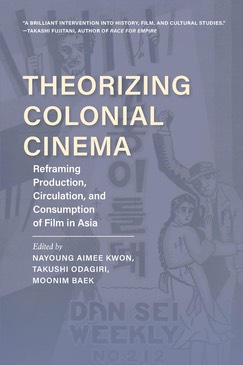
In my research on Japanese film theory, I have always tried to complicate the concept of “Japanese” in the name of the topic. I do that not just through critiquing the desire to find the origins of such film theory in supposedly “traditional” aesthetics, but also through recognizing that “Japan” and the nation were often contested within film theory. If Tsumura Hideo or Sawamura Tsutomu conceptualized cinema in support of Japan’s “holy war,” Tosaka Jun critiqued the ideology of Japan while attempting to conceive of film as an alternative way of knowing (his resistance eventually put him in jail, where he died).
Yet one of my regrets with the anthology we produced, Rediscovering Classical Japanese Film Theory, is that we did not include any thinkers writing in Japan’s colonies or colonial spaces. We in effect reproduced the geography of the nation by picking authors who were Japanese citizens writing in Japan and in Japanese. It is in part regret over that that I did some research on some of the theory that we missed. This was occasioned by a conference that took place at Duke University in November 2016 (I remember the general funk over and the protests against Trump’s victory). My paper was, on the one hand, a continuation of my thinking about the internalization of empire that I explored in my article "Colonial Era Korean Cinema and the Problem of Internalization" (which you can read here). Was film theory in the colonies internalizing the ideologies of Japanese film theory? But on the other hand, it was also an attempt to show that we cannot discuss Japanese film theory without thinking about empire—that empire is part of the “Japanese” in Japanese film theory.
That paper, as well as other papers from the conference, have finally been published in the book Theorizing Colonial Cinema: Reframing Production, Circulation, and Consumption of Film in Asia, edited by Nayoung Aimee Kwon, Takushi Odagiri, and Moonim Baek. Other contributors include, beyond the editors, Jane Gaines, Yiman Wang, Zhang Zhen, and Nadine Chan. Here is the abstract for my contribution, entitled “Colonial-Era Film Theory, Spectatorship, and the Problem of Internalization”:
This paper investigates the problem of internalization, or the colonization of the mind, in relation to colonial film culture of the Japanese empire. Following my earlier research on colonial era Korean film, which I argue problematizes the subjectivity open to such internalization, this paper investigates the relation of film theory to colonization. What was the role of film theory in the imperial metropole, and what valences did film theory produced by colonial subjects bear in the empire? Such questions are complicated by the fact that Japanese film theory exhibited what I call a “theory complex” in which even Japanese did not recognize Japanese film theory. What was the effect on the film theory of the colonized when the theory of colonizer itself was in a neo-colonial relationship with Europe? Considering the possibility that theorizing spectatorship was one means of reflecting on the colonial theorist’s own relationship to the metropole, I analyze a number of texts published in Japanese by writers in colonial Korea and the puppet state of Manchukuo, focusing in particular on articles written by Im Hwa and Oh Young-jin. In these, spectatorship becomes a problem for empire, as internalization is complicated by action over and against language. The effect of a push for a solution involves less internalization of empire than, in one case, the spectator pushed towards madness, or with Oh, imagining a cinema of attractions that overwhelms an externalized viewer.
Here’s the bibliographic info:
- Aaron Gerow, “Colonial-Era Film Theory, Spectatorship, and the Problem of Internalization,” Theorizing Colonial Cinema: Reframing Production, Circulation, and Consumption of Film in Asia, eds. Nayoung Aimee Kwon, Takushi Odagiri, and Moonim Baek (Bloomington: Indiana University Press, 2022), pp. 68-91. ISBN 9780253059758. Get it at Powells.

